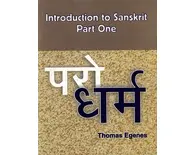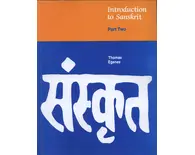Customers who bought this also bought
About this item
Preface to the First Edition:
The Sanskrit language possesses one special advantage over all the modern languages, viz., that the language lends itself to being moulded into verse and thus makes it easy for learners to get anything by heart and retain it in their memory. This is the reason why most of the ancient Sanskirt works, which were intended for study, are written in the form of verses.
In beginning the study of Sanskrit, the old custom was to learn by heart the Amarakosha, which contains nearly all those words which is necessary for an ordinary student of Sanskrit literature to know. This custom now prevails only among the Sastris, and that too, not as widely as before, while most of the students of English schools and colleges follow the modern method introduced by Professor Bhandarkar in his First and Second Book of Sanskrit.
There is no doubt that the modern method possesses several advantages over the old one; it has however, one defect, viz., that the student does not know any words beyond the vocabularies of the prescribed Sanskrit texts. Whenever, therefore, he attempts to read independently any of the works of the Sanskrit poets, he is forced every now and then to refer to the Sanskrit-English dictionaries of Professor Benfey and others, even for the interpretation of the simplest slokas. It occured to me that this defect could, to a certian extent, be removed by introducing a modified form of the old system of learning by heart the Amamakosha.
The original Amarakosha contains about 1600 slokas; it is impossible for any student of our High Schools to spare, from his numerous studies, enough time to commit to memory the whole of this mass, and even if he could, his labours, would be, to a large extent, vainly spent. For the Amarakosha contains many words which are rarely met with in classial Sanskrit literature.
In preparing this Abridgment of Amarakosha, it has been my sole endeavour to select only such words as occur in the works of generally read Sanskrit poets and dramatists and to put them in as few slokas as possible. I have succeed, thus reducing the number of slokas to 530. The slokas are taken, where possible, from the original Amarakosha, but in many places, I have been compelled to form new slokas. The method followed in forming them is the same as that of the original.
I have also introduced all these modern improvements, by which reference to the words can be made easy, and the whole work made more intelligible and useful. Thus the Index to the English words which has been appended to this book, will server the purpose of an English-Sanskrit dictionary for all the wants of an ordinary student. There is also an Index to the Sanskrit words.
Mahadev Shivram Gole, Poona.
Have a question?
Customer Reviews
This is a shorter copy of what yogis had to memorize, and it is extremely interesting to just read. I know it will help my Sanskrit practice. Thank You!This is a shorter copy of what yogis had to memorize, and it is extremely interesting to just read. I know it will help my Sanskrit practice. Thank You!Read less
Great service, thank you and Hare Krishna! पूर्णम् अस्ति धन्यवद NormanGreat service, thank you and Hare Krishna! पूर्णम् अस्ति धन्यवद NormanRead less
Amarasara is a must-have book for anyone who wants to enhance his skills in Sanskrit. This is an established book in Sanskrit grammar and usage and teaches through examples. This book has an unusual w... Read more Amarasara is a must-have book for anyone who wants to enhance his skills in Sanskrit. This is an established book in Sanskrit grammar and usage and teaches through examples. This book has an unusual way of page numbering along with a small footprint that deceives the eye - this book is exhaustive and self contained. Cons: The book uses very cheap paper, which makes for obscured prints and twisted pages. Overall, five stars for the price and contents.Read less
A must for all Sanskrit translators (advanced or amateur). This is an abridged version of Amarakosh which once was the only Sanskrit thesaurus. This comes very close to the parent. The only cons I can... Read more A must for all Sanskrit translators (advanced or amateur). This is an abridged version of Amarakosh which once was the only Sanskrit thesaurus. This comes very close to the parent. The only cons I can think of is the arbitrary page numbering. I have to keep several bookmarks to figure out where I would want to return. Other than that, this is a very useful book. Of course, for the price, it is unbeatable.Read less
A good dictionary it looks like-if you can read Sanskrit!-there are no Roman transliterations....that was my oversight,not a lack on the books part.A good dictionary it looks like-if you can read Sanskrit!-there are no Roman transliterations....that was my oversight,not a lack on the books part.Read less



![Bhagavad Gita As It Is [1972, Complete Edition] Bhagavad Gita As It Is [1972, Complete Edition]](https://krishnastore.com/images/cache/BGC-195x155.webp)









